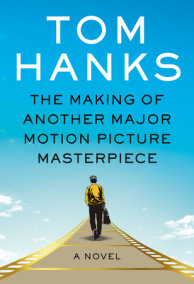 Do you love going to the movies? Do you enjoy watching ‘Behind the Scenes’ clips and documentaries? Do you like a good novel? If you can answer any of these questions with yes, you should at least consider putting Tom Hanks’ debut novel, The Making of Another Major Motion Picture Masterpiece, on your to-read pile. If you can answer all of them with yes, you should probably go and read it right now. (But finish this review first.)
Do you love going to the movies? Do you enjoy watching ‘Behind the Scenes’ clips and documentaries? Do you like a good novel? If you can answer any of these questions with yes, you should at least consider putting Tom Hanks’ debut novel, The Making of Another Major Motion Picture Masterpiece, on your to-read pile. If you can answer all of them with yes, you should probably go and read it right now. (But finish this review first.)
Tag Archives: Stories
No Story, No Life
Everything we do begins with a story. Without story, we would perish. We don’t get off that couch and head to the kitchen unless we have first told ourselves a little story: “There’s food in that kitchen, it will taste good, erase the feeling of hunger, and thanks to it I will survive.” We may not say those words out loud, and if we do, someone should call a doctor. But at the most primal level, that story is told and its lesson heeded.

An A‑May-zing Month for Animals
I like to think of May as one of the most amazing months – not only because it’s National Pet Month, but also because May 20 is National Rescue Dog Day in the United States. Let’s face it: Pets are so much more than just cute companions – they are fluffy family and friends as well as endless sources of comfort, joy, and hope. But what about all those animals out there who don’t have a human to look after them, love them back, and maybe even save them from horrible fates?
German Distance, American Naivety
As an American writer living in Berlin, I strain to understand and express some of the differences between my two homes. So many exceptions to any rule, no broad-brushstroke of a short essay is going to begin to capture anything but the most basic generalization. Still, let me try. Here’s a story plucked from memory.
“My Name” – Vignettes about You
Vignettes are wonderful! Sometimes described as a slice of life, vignettes can be so short that they take away the fear of ending up with a white page. Unlike a short story, there’s no defined beginning, middle, or end with a cast of characters, multiple conflicts, and the ultimate resolution phase. Instead, the vignette’s impressionistic scenes focus on one moment or give a particular insight into one character, idea, or setting.
The Mexican American author Sandra Cisneros is the unchallenged queen of vignette writing, and her collection of 44 vignettes, (1984) is a must read.
Childhood Memories
Memories are stories we tell ourselves.

“When I was younger, I remember how…” We cherry-pick. We have to. Otherwise, we’d remember what we wore and ate for lunch a day before our 6th birthday, and the week before that. TMI.








